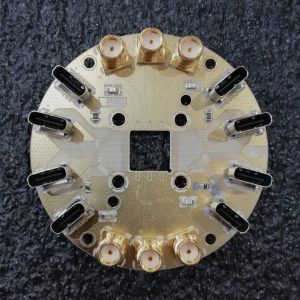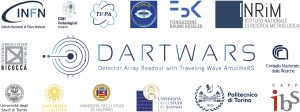DART WARS
(Detector Array Readout with Traveling Wave AmplifieRS)
2021/2024
The aim of the DART WARS project is to boost the sensitivity of INFN experiments based on low-noise superconducting detectors. This goal will be reached through the development of wideband superconducting amplifiers with noise at the quantum limit and the implementation of a quantum limited readout in different types of superconducting detectors.
Noise at the quantum limit over a large bandwidth is a fundamental requirement for challenging future applications, like neutrino mass measurement, next-generation x-ray observatory, CMB measurement, and dark matter and axion detection, in which the INFN is deeply involved. The sensitivity and the bandwidth of microcalorimeter detectors such as Transition Edge Sensors (TESs) and Microwave Kinetic Inductance Detectors (MKIDs) using dissipative readout are limited by the noise temperature and bandwidth of the cryogenic amplifier. Likewise, resonant axion-detectors, such as haloscopes, must probe a range of frequencies of several GHz keeping the system noise to the lowest possible level.
The need for a quantum limited microwave amplifier with large bandwidth operating at millikelvin temperatures is also particularly felt in many quantum technology applications, for example the rapid high-fidelity multiplexed readout of superconducting qubits. To this end, devices called traveling wave parametric amplifiers (TWPAs) are currently being developed. The nonlinear element of TWPAs is provided by Josephson junctions or by the kinetic in ductance of a high-resistivity superconductor.
The DART WARS project is a research effort to improve the performance and reliability of these amplifiers with the study of new materials and with improved microwave and thermal engineering. The long-term goal is to demonstrate, for the first time, the readout with different sensors (TESs, MKIDs, microwave cavities and qubits) opening the concrete possibility to increase the sensitivity of the next generation particle physics experiments.


